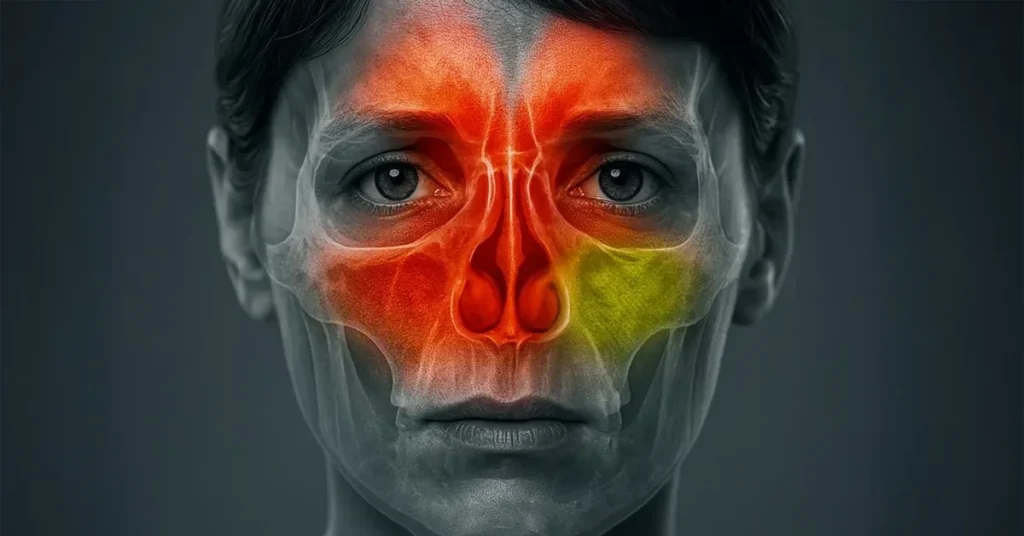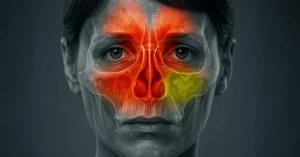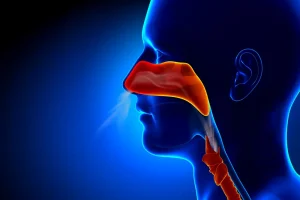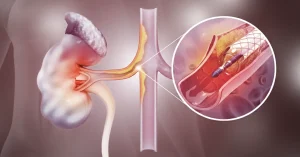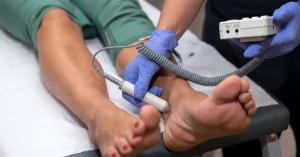What Is Chronic Rhinosinusitis?
Chronic rhinosinusitis is a condition defined by persistent inflammation of the sinuses, which are the cavities surrounding the nasal passages. The inflammation lasts for at least eight weeks and continues despite proper medical treatment.
This disorder affects the normal drainage of the sinuses, leading to mucus accumulation and blockage of airflow. Patients may experience difficulty breathing through the nose, swelling around the eyes, facial pain or pressure, and frequent headaches.
Causes Of Chronic Sinusitis
Chronic sinusitis has multiple causes, often involving a combination of anatomical, infectious, allergic, and immune factors. The most frequent causes include:
- Nasal polyps: Benign growths that can block the nasal passages and sinuses.
- Allergies: Reactions, including fungal allergies, that promote persistent inflammation.
- Deviated nasal septum: A deviation of the nasal wall that prevents normal sinus drainage.
- Facial trauma: Fractures or injuries that obstruct mucus pathways.
- Associated medical conditions: Examples include cystic fibrosis, gastroesophageal reflux, HIV, and other immune disorders.
- Respiratory infections: Viral infections such as colds can thicken mucous membranes and block drainage.
- Allergic rhinitis: Seasonal or perennial nasal inflammation that worsens sinus blockage.
- Immune system disorders: Certain immune cells, like eosinophils, can cause chronic sinus inflammation.
How Does Rhinosinusitis Manifest Itself?
The symptoms of chronic rhinosinusitis vary in intensity and may range from mild discomfort to severe impairment. They often involve the nose, throat, and eyes.
Common And Severe Symptoms
- Facial pain or pressure (forehead, cheeks, around the eyes);
- Marked nasal congestion or obstruction;
- Thick nasal discharge or postnasal drip, sometimes purulent;
- Reduced sense of smell (hyposmia) or complete loss of smell (anosmia);
- Fever, especially during acute exacerbations.
Less Severe (Minor) Symptoms
- Headache;
- Mild fever;
- Bad breath (halitosis);
- Fatigue or general malaise;
- Tooth pain, especially in the upper jaw;
- Persistent cough, worse at night;
- Sensation of fullness, pain, or pressure in the ears.
Predisposing Factors
Both genetic and environmental factors influence chronic sinusitis. Chronic sinusitis is regarded as a multifactorial condition, influenced by both genetic predisposition and environmental factors. To determine the cause of the symptoms, the doctor examines the nose and throat carefully, checking for areas of local tenderness.
For better visualization of the nasal passages, an instrument may be used to gently open the nostrils, followed by the application of a vasoconstrictor, which reduces congestion by narrowing the blood vessels.
Using a light source, the doctor then inspects the inside of the nose to identify inflammation or secretions. This examination also helps rule out anatomical problems such as nasal polyps or other structural abnormalities.
Genetic:
- Hereditary diseases such as cystic fibrosis;
- Anatomical abnormalities of the nose or sinuses;
- Systemic conditions that affect immunity.
Environmental:
- Recurrent infections;
- Trauma to the face or nasal area;
- Exposure to irritants or toxins;
- Medication-related reactions.
Diagnosis Of Chronic Rhinosinusitis
- Nasal endoscopy
This diagnostic procedure uses a thin, flexible or rigid tube equipped with a fiber optic cable and a small video camera. The instrument is gently inserted through the nostrils, allowing the doctor to directly observe the inside of the nasal passages. During the examination, the openings of the sinuses and sometimes even the interior of the sinus cavities can be seen in real time on a screen. This provides a clear view of any inflammation, obstruction, or abnormal tissue. The procedure is also referred to as endoscopic rhinoscopy. - Imaging investigations (CT/MRI)
Computed tomography (CT) and magnetic resonance imaging (MRI) are advanced imaging techniques that create detailed pictures of the sinuses and surrounding structures. These scans reveal areas of deep inflammation or blockages that cannot be detected during a standard physical exam. CT scans are particularly valuable and are considered the gold standard in evaluating chronic sinusitis, providing high-resolution images of both bone and soft tissue. - Analysis of nasal secretions (bacterial or fungal cultures)
Although not required for every patient, laboratory analysis of nasal secretions may be performed in complex or treatment-resistant cases. A sample of mucus is collected and examined to determine if bacteria or fungi are present. Identifying the exact pathogen responsible for infection helps doctors choose the most effective therapy when standard treatment has not been successful. - Allergy testing
If allergies are suspected to play a role in persistent sinus inflammation, the doctor may recommend a skin allergy test. This is a quick and straightforward procedure where the skin is exposed to small amounts of common allergens. The test determines whether specific substances are responsible for triggering the patient’s symptoms, allowing for targeted treatment of the allergic component.
Possible Complications
- Exacerbation of asthma: Chronic sinus inflammation can worsen asthma symptoms.
- Meningitis: Infection may spread to the protective membranes around the brain and spinal cord.
- Vision problems: Infection spreading to the eye area may impair vision or cause blindness in severe cases.
- Blood clot formation: Infection may affect brain veins, increasing the risk of stroke.
Treatment Of Chronic Rhinosinusitis
Medication
Treatment depends on the severity of symptoms and the underlying cause. Options include:
- Nasal rinses with saline solution: Clear secretions and reduce inflammation.
- Nasal corticosteroid sprays: Reduce swelling of the nasal lining. Common agents include budesonide, mometasone, and fluticasone.
- Systemic corticosteroids (oral or injectable): Used in severe cases, especially with nasal polyps. Examples: prednisone, methylprednisolone, dexamethasone. Prescribed for short periods due to side effects.
- Decongestants: Oral or nasal formulations relieve congestion but should be used short-term.
- Analgesics and antipyretics: Ibuprofen or paracetamol relieve pain and fever. Aspirin should be avoided in children and in patients with asthma and aspirin sensitivity.
- Antibiotics: Only prescribed if bacterial infection is confirmed.
- Immunotherapy: For patients with allergies contributing to sinus inflammation.
Surgical Treatment
If medical therapy does not resolve symptoms, surgery may be considered.
Endoscopic sinus surgery:
A minimally invasive procedure where a thin endoscope with a camera is inserted through the nasal passages. Using precision instruments, the surgeon removes:
- Nasal polyps;
- Thickened or inflamed tissue;
- Obstructions blocking sinus drainage.
The openings of the sinuses may also be widened to improve drainage and prevent recurrence. Talk to us and schedule a consultation to see which procedure is right for you.
Medical consultant: Dr. Iuliu Cătană
Frequently Asked Questions
Is chronic sinusitis contagious?
No. Chronic sinusitis cannot be transmitted from person to person. However, viral respiratory infections that may trigger acute sinusitis can be contagious.
What tests are needed for diagnosis?
- ENT examination;
- Nasal endoscopy;
- Computed tomography (CT);
- Allergy testing;
- Analysis of nasal secretions (in special cases).
Can chronic sinusitis be treated with medication alone?
In many cases, medication is sufficient to control symptoms. However, if symptoms persist, surgical intervention may be necessary.
When is surgery necessary?
Endoscopic sinus surgery is required when symptoms do not improve with medication or when physical obstructions, such as nasal polyps, are present.
Can episodes of chronic sinusitis be prevented?
Yes. Preventive measures include regular nasal irrigation, avoiding allergens, treating infections promptly, and quitting smoking.

